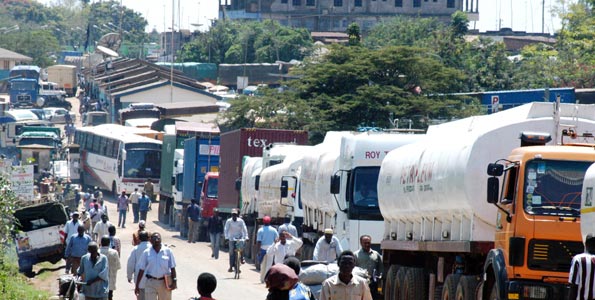SADC, EAC and COMESA seek to implement Tripartite Free Trade Area

Nigeria Today | 26 October 2016
SADC, EAC and COMESA seek to implement Tripartite Free Trade Area
The 10th EAC-COMESA-SADC Tripartite Committee of Senior Officials for Trade, Customs, Finance, Economic matters and Internal Affairs meeting opened in Nairobi, Kenya on Tuesday to resolve issues that remain outstanding before the implementation of the Tripartite Free Trade Area.
Delegates from 26 member countries of the three African regional economic communities (RECs) including East African Community (EAC), Common Market for Eastern and Southern Africa (COMESA) and Southern Africa Development Community (SADC) aim to resolve the issues that remain outstanding after the launch of the Tripartite Free Trade Area during a summit in Sham el Sheikh in Egypt June, 2015.
Permanent Secretary Ministry of Trade Ambassador Julius Onen is leading the EAC Delegation. Onen noted that as a region, partner states have made progress on most of the outstanding issues and are ready to move forward with the finalization of the negotiations with other regional blocs.
He informed the meeting that EAC had finalized all the tariff offers, however, some countries had not yet responded to the offers.
It is now over a year since the Tripartite FTA was launched in Sharm El Sheikh, Egypt, however, member states have failed to agree on some issues including tariff offers, rules of origin, trade remedies and the ratification of the Agreement.
Onen noted that Uganda is ready to ratify the TFTA Agreement as soon as all the outstanding issues are finalized so as to pave way for actual implementation, as the country stands to benefit a lot in terms of market access once implementation of the Agreement takes effect.
He further noted that the TFTA has more benefits to Uganda given that it has three pillars – market integration, cooperation in industrialization and infrastructure development and the movement of business persons. The Tripartite region will also provide the potential for tourism and movement of professionals across the borders in the region after the conclusion of the negotiation of trade in services in phase II of the negotiations.
It is also clear that only 18 out of 26 countries have so far signed the Tripartite Agreement. Uganda signed the Agreement during the launch in Egypt however none of the Member/Partner States has so far ratified the Tripartite Agreement.
The meeting precedes the fourth meeting of the Tripartite Council of Ministers that is scheduled to take place on October 30 and 31 2016 in Nairobi, Kenya. Uganda will be represented by Trade Minister Amelia Kyambadde.
The Tripartite FTA represents an integrated market of 26 countries with a combined population of 632 million people which is 57% of Africa’s population and with a total Gross Domestic Product (GDP) of$ 1.3 Trillion (2014) contributes 58% of Africa’s GDP. If fully implemented, the Tripartite FTA is expected to provide expanded trade opportunities to Uganda’s Private Sector in respect to trade in goods and services.
Speaking on behalf of the Minister of Trade, Industry and Cooperatives of Kenya Adnan Mohammed, the Permanent Secretary at the State Department of Trade, Kenya Dr. Chris Kiptoo encouraged parties to work towards expeditious resolution of the outstanding issues so as to pave way for smooth implementation of the TFTA Agreement by member and partner states.
“There is need for momentum in the implementation of the Tripartite FTA because it has the potential to be a game changer of trade in Africa through helping member countries to improve their competitiveness and participation in the global value chain’, said Dr. Kiptoo.
He added that member states needed to forge a way forward for the implementation of the TFTA by addressing the enormous trade barriers amongst themselves and the institutional and infrastructural challenges that pose a challenge for the implementation of the Agreement.
Among the key outstanding issues that are being negotiated by the member states in the Nairobi meeting include; tariff offers, the Rules of Origin, the Trade Remedies and Dispute Settlement, modalities for phase II negotiations and the Signature and Ratification of the TFTA.
On the tariff offers and in accordance to modalities of phase one TFTA negotiations, each member are expected to negotiate their tariff offers and afterwards exchange those tariff offers with other member countries and they will be populated as Annex I to the TFTA Agreement.
To date, only EAC, Egypt and South African Customs Union (SACU) members that have exchanged tariff offers and are currently engaged in negotiations of their exchanged tariff offers. So far no bilateral negotiations have been concluded for inclusion in Annex I of the Agreement, which has derailed the conclusion of the negotiations.
On the Rules of Origin (RoO), Parties have finalized negotiations of RoO text which is Annex IV of the Agreement and outstanding is finalization of negotiations on appendix one of the Annex on the least product rules.
The outstanding issues on Trade remedies and Dispute settlement are mainly on the legal inconsistencies in the Trade Remedies Annex especially with the WTO trade remedies provisions. Negotiations are centered on whether or not to delink the TFTA provisions on Trade remedies and dispute settlement of the agreement from the WTO provisions.
It is critical that members agree on the remedies mechanism so as to be able to develop related policy nets against unfair trade practices such as anti-dumping measures, countervailing measurers and anti subsidies regimes. Such measures are intended to protect domestic industries/producers from unfair competition and to provide policy space.
On the signature and ratification of the Tripartite Agreement, member states are still indicating varying positions with some stating that the Agreement and all its Annexes should be finalized first to enable them deposit the instruments for signature and ratification. However, other member states are willing to sign the Agreement notwithstanding that there are outstanding issues to be finalized.





